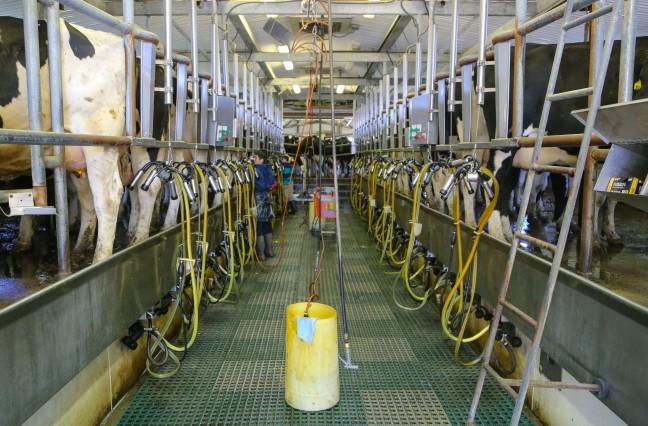Researchers found ways to reduce greenhouse gas emissions on farms while increasing profitability and provide opportunities for students.
The Dairy Coordinated Agricultural Project began in 2013 with a $10 million grant as one of many projects related to climate change, food, fiber and fuel. This project is part of a larger Sustainable Dairy Project, which researches ways to adapt to climate change and mitigate efforts in dairy production systems in the Great Lakes region.
The U.S. dairy industry hopes to reach their goal of reducing greenhouse gas emissions by 25% by 2020.
The University of Wisconsin led the project, working with seven other universities, the U.S. Department of Agriculture and the Innovation Center for U.S. Dairy. The USDA funds large-scale multi-million dollar projects in order to “promote collaboration, open communication and the exchange of information,” according to its website.
University of Wisconsin professors Molly Jahn and Matthew Ruark are leaders on the project.
“Dairying generates methane several different ways, and this grant was meant to try to measure the emission of greenhouse gases from dairy and to figure out how to reduce those emissions through various techniques,” Jahn said.
UW partnered with other organizations to perform innovative research and ensure the information will be used by the dairy community, Ruark said.
Greenhouse gas emissions on dairy farms is produced from cows’ digestion, manure storage and spreading, and growing crops for feed. A dairy cow can produce up to 20 or more gallons of manure and urine everyday. Methane is a byproduct that is 25 times stronger than carbon dioxide at trapping heat in the atmosphere. The impact of one pound of nitrous oxide from manure and fertilizer is 300 times that of one pound of carbon dioxide, according to the U.S. Environmental Protection Agency.
Dairy farms could reduce emissions by a third to almost half through a combination of ideal cow genetics, improved feeding strategies and better manure management. If these practices were implemented, farms could also produce more milk with less feed, according to a news article from UW.
The increase in efficiency will increase profits for an industry that is struggling. Wisconsin’s dairy prices have been fluctuating for four years, according to a Badger Herald news article from last year.
UW professor describes importance of sustainability to indigenous Arctic communities
Researchers are recommending ways farmers can adapt to the warming climate, such as how to predict the ventilation needed in a barn to keep cows cool and productive. Higher temperatures are associated with decreased productivity in animals and increased survival of parasites and disease pathogens. Decreased productivity in cows means reduced ability to produce milk, gain weight and conceive, according to research.
The project’s findings have been made public on the Virtual Farm website hosted by Pennsylvania State University. This virtual farm shows what typical dairy farming practices are like with different numbers of cows.
The solutions, however, are not singularly applicable. In terms of manure, the management system differs upon design, location, climate, regulations, soil type, access to capital and labor and other factors, according to the Virtual Farm website.
There are a few different ways to process manure, but the most eco-friendly is through an anaerobic digester, the professors said. This process uses microorganisms to degrade organic matter in manure, which produces biogas. Biogas contains methane that can be burned for heat, combusted for electricity or cleaned and compressed for vehicle fuel, according to the Virtual Farm website.
The project was divided into a measurement team, modeling team and extensive team, Jahn said. The measurement teams collected data from the farms, the modeling team then applied the data into the designs and the extensive team anchored all of the models to farmer decision making, Jahn said.
“Computer models and life cycle assessment show where greenhouse gases can be reduced to alleviate global warming potential without pollutant trade-offs,” according to the final report.
The project provided opportunities for students as well. Through a partnership with Harold S. Vincent High School in Milwaukee, students now have the opportunity to learn about new subjects, such as animal science, food science, environmental science and more. Undergraduate students were provided summer internship opportunities at UW, Cornell University, Penn State University, and North Carolina Ag and Tech State University, according to the Dairy CAP report.
The undergrads participated in field and laboratory experiments related to sustainable dairy production. Undergraduates and graduate students presented their research findings to peers at professional, scientific and regional meetings, according to the Dairy CAP report.
Ruark is including his research findings on climate change and soil health in the Soil Science/Plant Pathology 323 class he teaches. Jahn included her research findings in an agronomy class, “A Systems View of Life.”

















